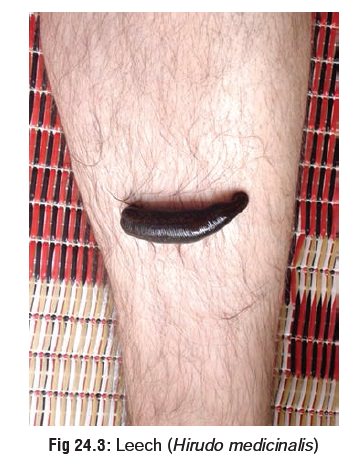Chapter: Modern Medical Toxicology: Cardiovascular Poisons: Anticoagulants and Related Drugs
Hirudin - Antifibrinolytic Cardiovascular Poison
Hirudin
Hirudin is a polypeptide, present in leeches (Hirudo medici-nalis) (Fig 24.3), and is a highly selective thrombin inhibitor.It is a naturally occurring 65 -amino acid polypeptide that is produced from the saliva of the medicinal leech. It is now being produced in other forms as a recombinant molecule.
Recombinant
derivatives of hirudin include argatroban, biva-lirudin, desirudin, efegatran,
inogatran, lepirudin, napsagatran, and ximelagatran.
Direct
thrombin inhibitors target sites on the thrombin molecule responsible for
substrate recognition and/or cleavage. The substrate recognition site (exosite
1) binds thrombin to fibrinogen prior to its enzymatic actions. The catalytic
(active) site is responsible for activating platelets and the cleavage of
fibrinogen to fibrin for thrombus formation. Direct thrombin inhibitors can
block both the active site and exosite 1 or the active site alone, specifically
inhibiting thrombin activity. Heparin is unable to inactivate thrombin because
the heparin-activated antithrombin binds to the active site and blocks the
fibrin-binding site. Because direct thrombin inhibitors do not bind to the
fibrin-binding site, they can bind both unbound and fibrin-bound thrombin. They
are also not inhibited by platelet factor 4.

The
most common complication observed with selec-tive thrombin inhibitor therapy is
haemorrhage, although the incidence of major bleeding is less when compared
with other anticoagulants. Bleeding from puncture wound sites, anaemia,
haematomas, haematuria, gastrointestinal and rectal bleeding, epistaxis,
intracranial bleeding and haemothorax have been reported. Concurrent treatment
with thrombolytics (e.g. rt-PA, streptokinase), coumarin derivatives (e.g.
Vitamin K antago-nists), and drugs that affect platelet function may increase
the risk of bleeding complications. Thrombolytics may enhance the effect on
aPTT prolongation. Other non-haemorrhagic effects seen in clinical trials
include hypotension, cardiac arrest, dyspnoea, fever, nausea, vomiting,
diarrhoea, cardiac arrhythmias, and abnormal hepatic and renal function. Some
of these complications are likely related to underlying disease processes.
Acute allergic reactions and formation of antihirudin antibodies have also been
reported.
Overdose
results in significant haemorrhage which responds well to prothrombin complex
concentrate.
Treatment
involves symptomatic and supportive measures. If bleeding is suspected, monitor
patient’s haematocrit, haemo-globin, activated partial thromboplastin time,
INR, platelet count and fibrinogen. Monitor vital signs, ECG, renal and hepatic
function in symptomatic patients. No specific antidotes are available for the
direct thrombin inhibitors. If excessive anticoagulation occurs, discontinue
the drug or decrease the infusion dosage. If necessary, blood loss and reversal
of bleeding tendency can be managed with packed red blood cells and cryoprecipitate
or fresh frozen plasma.
Related Topics